Nobel Peace Laureate Raises Alarm On Deteriorating Situation in Iran
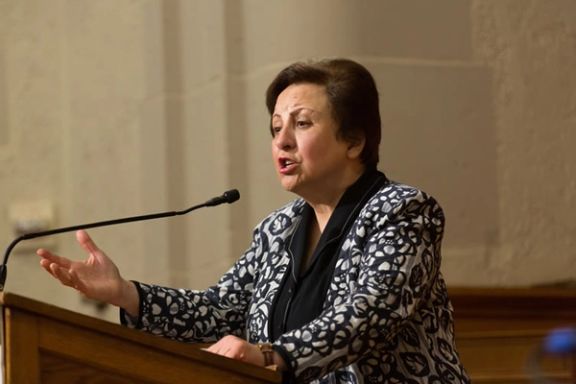
Nobel Peace Prize laureate Shirin Ebadi delivered a speech at the Nobel Peace Conference on Friday, drawing attention to the deteriorating human rights situation in Iran.

Nobel Peace Prize laureate Shirin Ebadi delivered a speech at the Nobel Peace Conference on Friday, drawing attention to the deteriorating human rights situation in Iran.
She also discussed the determination of the Iranian people to peacefully bring about change in the Islamic Republic reigme.
In her address, Ebadi highlighted the bravery of young Iranians, including teenage girls who risked their lives to protest on the streets. She emphasized that these actions signify a society awakened to the need for peaceful change and a desire to overthrow the current regime.
Ebadi also commemorated the tragic death of Mahsa Amini in detention, noting that citizens from hundreds of cities across Iran took to the streets to declare their rejection of the regime. She lamented that despite peaceful protests, the government responded with violence.
Addressing the international community, Ebadi urged hope and persistence in the face of dire circumstances, reminding everyone that many countries grapple with similar challenges. She expressed confidence that human rights defenders will contribute to improving these situations and called for continued efforts.
Ebadi brought attention to grim statistics, revealing that at least 80 of the victims in last year's nationwide protests were under 18 years old, emphasizing that this is only an estimate.
In closing, Shirin Ebadi promised the audience that this would be the last time she addresses the dire conditions in Iran, and her next discourse will focus on victories.
Shirin Ebadi, a vocal supporter of the Women, Life, Freedom protest movement, has been actively shedding light on the various facets of these protests and the violent response of the Iranian security forces.
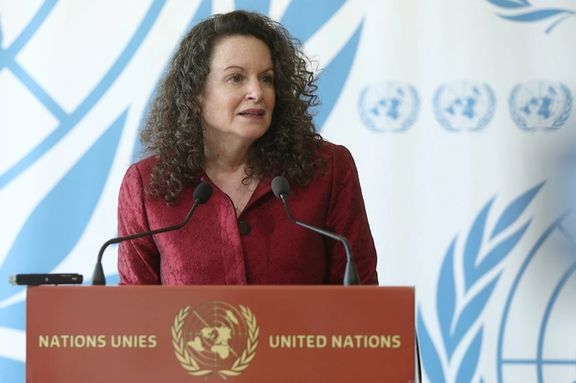
US ambassador to the UN's Human Rights Council condemns Iranian officials in UN leadership roles on the anniversary of Mahsa Amini's death.
Michèle Taylor's comments come as the Islamic Republic is set to chair the UN Human Rights Council Social Forum this November.
Taylor stated, "As we approach the one-year anniversary of Mahsa Amini's tragic death, let me be clear: The US reasserts that Iran, with its appalling human rights record, has no place in leadership roles within the UN human rights ecosystem. The time for accountability is now."
The controversy surrounding Iran's involvement in UN leadership positions has been a contentious issue. In June, the Islamic Republic secured a leadership role as one of the vice-presidents of the UN General Assembly, prompting reactions from several member states and numerous activists.
In May, Iran's UN ambassador, Ali Bahraini, was appointed to chair the UN Human Rights Council 2023 Social Forum, leading to widespread anger and indignation. The forum is scheduled to take place in Geneva on November 2nd and 3rd.
In response to these appointments, UN Watch, an independent human rights organization, launched a petition to UN Secretary-General Antonio Guterres, urging him to cancel the appointments. Additionally, UN Watch submitted a resolution to the UN aimed at overturning the decision, drawing further attention and scrutiny to Iran's involvement in UN leadership positions.

President Ebrahim Raisi’s administration has increased the budget allocated to the Iranian Ministry of Culture by more than 300%, causing widespread controversy.
Whilst economic challenges persist across the country, Raisi announced that the current budget of $24 million will be increased to a staggering $80 million.
Culture Minister Mohammad Mehdi Esmaili said, "When we took over the government, the budget was 12,000 billion rials, but currently, the ministry's budget has increased to 40,000 billion rials."
Esmaili explained that this dramatic increase was, in part, due to the allocation of one percent of the budget of banks and state companies to cultural endeavors, which, if realized, could dwarf the Ministry of Culture's budget by several multiples.
However, this substantial boost in cultural funding has been met with criticism, especially in light of Iran's ongoing economic woes.
A considerable portion of Iran's population continues to live below the poverty line, with analysts citing the government's inability to address the economic crisis effectively.
Iran has grappled with high inflation rates that have exceeded 40% for several years. This dire economic situation has severely impacted the purchasing power of salary earners, whose wages have experienced only marginal increases.
Consequently, the majority of Iranians are facing economic hardship, struggling to afford basic necessities like meat, fruits, and vegetables, with consumption levels plummeting by half.
Moreover, hundreds of millions of dollars are allocated annually to seminaries and various religious organizations to disseminate the clerical regime's propaganda, further fueling concerns about resource allocation amidst economic hardship.
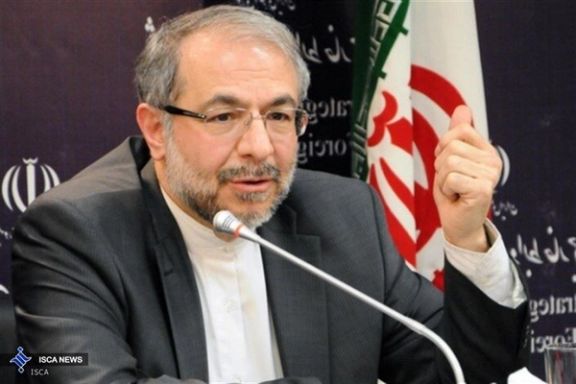
Iran’s assistant FM indirectly criticized the remarks made by the Taliban's Foreign Minister regarding the establishment of an inclusive government in Afghanistan.
Rasoul Mousavi emphasized the importance of "peace, stability, security, and sustainable development" in relation to the formation of a comprehensive government in Afghanistan as well as stating that "personalization" cannot exempt the Taliban from international responsibilities.
He cited United Nations Security Council resolutions 2513 and 2593, as well as consensus meetings among neighboring countries including Pakistan, China, Uzbekistan, and Iran
Mousavi spoke following criticism from Amir Khan Muttaqi, the Taliban's Foreign Minister, against countries advocating for an inclusive government in Afghanistan. Although no specific reference was made to Iran, it is widely assumed that his remarks were aimed at the Islamic Republic. "Our prisons do not have as many inmates as you execute,” he said.
In recent years, Iran has faced allegations of making opponents disappear and executing them. "In your country, thousands have disappeared, yet nobody dares to ask about it," Muttaqi.
Hossein Amir-Abdollahian, the Foreign Minister of the Islamic Republic, had previously stated that the Taliban is "part of the reality of Afghanistan, not all of it." He emphasized that Iran does not recognize the Taliban government until the formation of an all-inclusive government and expressed dissatisfaction with the Taliban's policies regarding women's education.
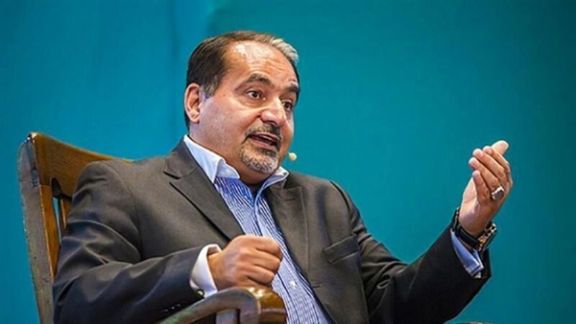
Lawmakers have written to Gen Anthony J. Cotton to probe why an Iranian regime insider was invited as a key speaker to the recent STRATCOM Deterrence Symposium.
The chair of the US House Armed Services Committee Mike Rogers (R-Ala.), and the ranking member of the Senate Armed Services Committee, Sen Roger Wicker (R- Miss.) have asked Gen. Cotton for details about those involved in the decision to invite Hussein Mousavian, a former high-ranking Iranian official. Mousavian who is a faculty member at Princeton has been praised in the past by former Iranian foreign minister Javad Zarif about his role in advocating for the policies of the regime in the United States.
The affair in mid-August that was revealed earlier this week led to an uproar on social media. Former US officials, analysts and Iranian activists condemned the move by the US military to invite Mousavian. Some quipped that perhaps Vladimir Putin and other US adversaries should also be considered as speakers as Pentagon events.
The lawmakers pointed out in their letter that Mousavian is “A propagandist of the regime since 1980, Mousavian served as the Iranian regime’s Ambassador to Germany in 1992 when the regime’s intelligence operatives assassinated four Iranian dissidents in Berlin. In response, German authorities forced Mousavian to leave the country along with several other Iranian “diplomats” and intelligence operatives.“
Mousavian made headlines last year for bragging about revenge against American officials over the targeted killing of IRGC's Quds Commander Qasem Soleimani. In January 2022, his remarks in a documentary made in Iran to mark Qassem Soleimani’s death anniversary led to controversy when he gloated about how Iran’s threat to avenge Soleimani killing frightened the wife of Brian Hook, Washington’s special envoy for Iran at the time. “An American told me that Brian Hook’s wife had not slept for several days and that she was shaking and crying. That’s how afraid they were” Mousavian said gleefully in the documentary.
A STRATCOM spokesman later told the Washington Free Beacon that "We were aware of Mr. Mousavian’s previous position within the Iranian government and believe that... we would have benefited from that insight into an opposing viewpoint."
The lawmakers sharply criticized the move to invite Mousavian and said, “While we appreciate the importance of improving our understanding of adversary perspectives and motivations in formulating deterrence policies, providing Mousavian with an officially sanctioned U.S. Government platform for spreading historical falsehoods and Iranian regime propaganda is profoundly ill-advised.“
They went on to ask Gen. Cotton to provide “the names and positions of all officials responsible for approving the invitation to Mousavian,” and asked if STRATCOM provided “compensation for transportation, lodging or a per diem to Mr. Mousavian? Was Mousavian provided with an honorarium? If so, how much?“
Many critics had raised questions about whether US taxpayer funds were used to pay an Iranian regime advocate to appear in the STRATCOM event.
Earlier, other lawmakers had already voiced frustration over the incident. "Mousavian helped lead the murderous Iranian regime’s efforts to obtain nuclear weapons so it could threaten the United States and our allies with annihilation," said Rep. Jim Banks (R-IN), a member of the House Armed Services Committee. "Now he’s in semi-retirement at Princeton as a full-time propagandist for the IRGC. Inviting him to spread lies at a US military seminar is insanity."
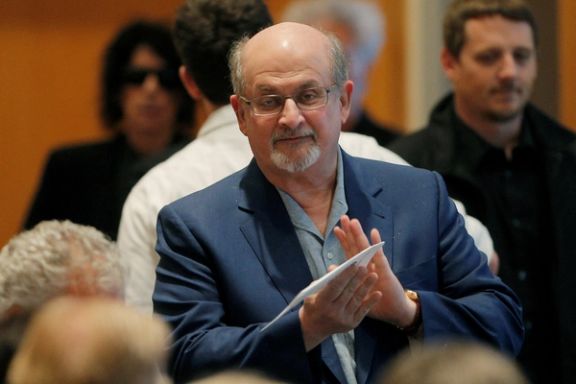
The investigation into last year’s nearly fatal attack on Salman Rushdie has expanded to explore potential international involvement, according to a US district attorney.
Jason Schmidt, the US district attorney overseeing the case, revealed a separate inquiry led by the US federal government, specifically the US Attorney's Office into the case of Hadi Matar with a focus on Iran. Matar, a 25-year-old man accused of stabbing Rushdie multiple times during the writer’s appearance at a summer cultural festival last August is now accused of having possible connections to foreign entities.
“There are some areas that we have to sort of confine ourselves to the four corners of the charges that we've asserted, which is essentially an attempted murder in the second-degree charge. That's our top count,” said Schmidt.
This scrutiny is linked to Iran's historical involvement due to Ayatollah Khomeini's 1989 fatwa against Rushdie because of what he asserted were sacrilegious sections regarding Islam in Rushdie's novel, "The Satanic Verses."
Iranian religious groups have also offered rewards for Rushdie, with such offers extending as recently as last year.
While Matar's assault on Rushdie was initially seen as an individual act, concerns have arisen regarding foreign support, especially given Matar's time in Lebanon and his possession of a counterfeit Hezbollah-related ID.
The investigation's complexity extends beyond local jurisdiction, involving national security and diplomacy amid ongoing negotiations with Iran.
Experts suggest that Matar was possibly influenced by Hezbollah during his time in Lebanon and that this may have played a role in his alleged attack. Iran has denied direct involvement but expressed support for the attack.
The focus of the investigation remains on Matar, with the US State Department imposing sanctions on an Iranian organization linked to bounties on Rushdie.
Tensions between the US and Iran have escalated in recent years, marked by events such as the assassination of General Qasem Soleimani and alleged plots against US officials.






